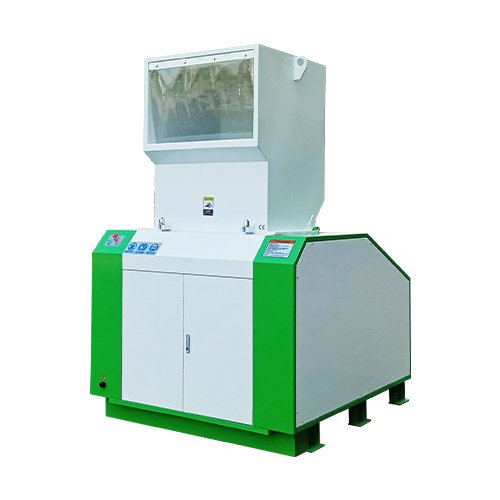Jedes Jahr landen weltweit große Mengen an Kunststoffabfällen in den natürlichen Ökosystemen und stellen eine ernsthafte Bedrohung für die Gesundheit des gesamten Planeten dar. Kunststoff ist in der natürlichen Umwelt nur schwer abbaubar, es kann Hunderte von Jahren dauern, bis er sich vollständig zersetzt. Angesichts dieser ernsten Situation ist das Kunststoffrecycling besonders wichtig, und die Kunststoffzerkleinerungsmaschine spielt dabei eine unverzichtbare Rolle. Die Kunststoffzerkleinerungsmaschine kann den Kunststoffabfall in kleine Partikel zerkleinern und so die Voraussetzungen für eine anschließende Recyclingbehandlung schaffen, wodurch die Kunststoffverschmutzung wirksam verringert und der Umweltschutz gefördert wird.
Verständnis des Kunststoffbrechers
Kunststoffzerkleinerer sind mechanische Geräte, die darauf spezialisiert sind, Kunststoffabfälle in kleine Partikel zu zerkleinern. Sie zerschneidet, quetscht oder zerreißt große Kunststoffteile durch verschiedene mechanische Prinzipien, um deren Größe stark zu reduzieren und den anschließenden Recyclingprozess zu erleichtern. Je nach den unterschiedlichen Zerkleinerungsprinzipien und -strukturen gibt es hauptsächlich die folgenden Arten von Kunststoffzerkleinerern:
- Backenbrecher: Zerkleinerung von Kunststoffen mit Hilfe von zwei Backen, die sich relativ zueinander bewegen.
- Hammerbrecher: Der Kunststoff wird durch den mit hoher Geschwindigkeit rotierenden Hammerkopf, der auf den Kunststoff trifft, zerkleinert.
- Scheren CRusher: Durch zwei oder mehr Relativbewegungen des Schermessers wird der Kunststoffzerkleinerer abgeschnitten.
- Klingenbrecher: Eine rotierende Welle, die mit einem oder mehreren Flügeln ausgestattet ist die ineinandergreifen, um Kunststoff zu zerreißen.

TDie Schlüsselfunktion des Kunststoffzerkleinerers beim Recycling
1. Zerkleinern großer Kunststoffteile
Kunststoffabfälle gibt es in verschiedenen Formen und Größen, und viele Kunststoffprodukte wie Kunststoffflaschen, Kunststoffeimer, Kunststoffrohre usw. sind so groß, dass sie nur schwer direkt recycelt werden können. Eine Kunststoffzerkleinerungsmaschine kann diese großen Kunststoffteile in kleine Partikel zerkleinern, so dass ihre Größe stark reduziert wird und die anschließenden Reinigungs-, Sortier-, Schmelz- und anderen Verarbeitungsprozesse erleichtert werden. So kann beispielsweise ein großes Kunststofffass nach der Zerkleinerung durch den Doppelwellenzerkleinerer in kleine Partikel mit einem Durchmesser von wenigen Zentimetern verwandelt werden, was die Effizienz des Recyclingprozesses erheblich verbessert.
2. Verbesserung der Recyclingeffizienz
Zerkleinertes Kunststoffgranulat ist kleiner und dichter, so dass der Kunststoff bei Transport und Lagerung deutlich weniger Platz einnimmt, was die Transportkosten und den Platzbedarf für die Lagerung senkt. Darüber hinaus lassen sich kleinkörnige Kunststoffe leichter weiterverarbeiten. Bei der Kunststoffgranulierung können kleinteilige Kunststoffe beispielsweise schneller geschmolzen und gemischt werden, was die Produktionseffizienz erhöht und somit die Effizienz der gesamten Kunststoffrecycling-Industriekette verbessert.
3. Anpassung an eine breite Palette von Kunststofftypen
Verschiedene Arten von Kunststoffen haben unterschiedliche physikalische Eigenschaften, wie Härte und Zähigkeit. Der Backenbrecher eignet sich für die Verarbeitung von Kunststoffen mit hoher Härte aufgrund seiner starken Zerkleinerungsfähigkeit bei der Extrusion, während der Hammerbrecher aufgrund seiner Hochgeschwindigkeits-Schlageigenschaften für die Verarbeitung weicherer Kunststoffe geeignet ist. Durch die Wahl des richtigen Brechertyps können Sie alle Arten von Kunststoffabfällen effizient verarbeiten und die Anforderungen der verschiedenen Recyclingverfahren erfüllen.
4. Verringerung der Umweltverschmutzung
Die massive Anhäufung von Kunststoffabfällen stellt eine enorme Belastung für die Umwelt und insbesondere für Deponien dar. Kunststoffzerkleinerer können das Volumen der Kunststoffabfälle erheblich reduzieren, indem sie die Kunststoffe in kleine Partikel zerkleinern und so den von Deponien belegten Platz verringern. Darüber hinaus kann das zerkleinerte Kunststoffgranulat zur Herstellung neuer Kunststoffprodukte oder für andere Zwecke wiederverwendet werden, wodurch der Bedarf an neuen Kunststoffen sinkt. Dadurch werden nicht nur Rohstoffressourcen wie Erdöl eingespart, sondern auch die Umweltverschmutzung durch die Kunststoffherstellung, z. B. durch Treibhausgasemissionen, weiter verringert.

PPraktisch Advice für TDie Verwendung von Plastic CRusher
1. Auswahl der geeigneten Ausrüstung
Beim Einsatz eines Kunststoffzerkleinerers besteht der erste Schritt darin, den richtigen Zerkleinerer je nach Art des Kunststoffs und der Verarbeitungsanforderungen auszuwählen. Wenn Sie beispielsweise eine große Anzahl harter Kunststoffrohre verarbeiten müssen, ist ein Backenbrecher möglicherweise die bessere Wahl; wenn Sie hingegen hauptsächlich mit weichen Kunststoffen wie Kunststofffolien zu tun haben, wäre ein Hammerbrecher besser geeignet.
2. das Umweltbewusstsein zu stärken
Bei der Auswahl eines Kunststoffzerkleinerers sollten geräuscharme und energiesparende Geräte Vorrang haben, um die Auswirkungen auf die Umwelt zu verringern. Zum Beispiel, einige Kunststoffzerkleinerer mit energiesparender Technologie und lärmreduzierendem Design können den Energieverbrauch und die Lärmbelästigung verringern und gleichzeitig die Effizienz der Zerkleinerung sicherstellen. Darüber hinaus kann die Umweltleistung durch die Optimierung der Betriebsparameter der Anlage weiter verbessert werden.

Conschluss
Der Kunststoffzerkleinerer spielt eine wichtige Rolle im Kunststoffrecyclingprozess. Er ist nicht nur in der Lage, große Kunststoffteile in kleine Partikel zu zerkleinern, um die Recyclingeffizienz zu verbessern, sondern passt sich auch an eine Vielzahl von Kunststoffarten an, um die Umweltverschmutzung zu verringern. Durch die richtige Auswahl und Verwendung eines Kunststoffzerkleinerers können Sie die Effizienz und Qualität des Kunststoffrecyclings effektiv verbessern und die negativen Auswirkungen von Kunststoffabfällen auf die Umwelt verringern.
